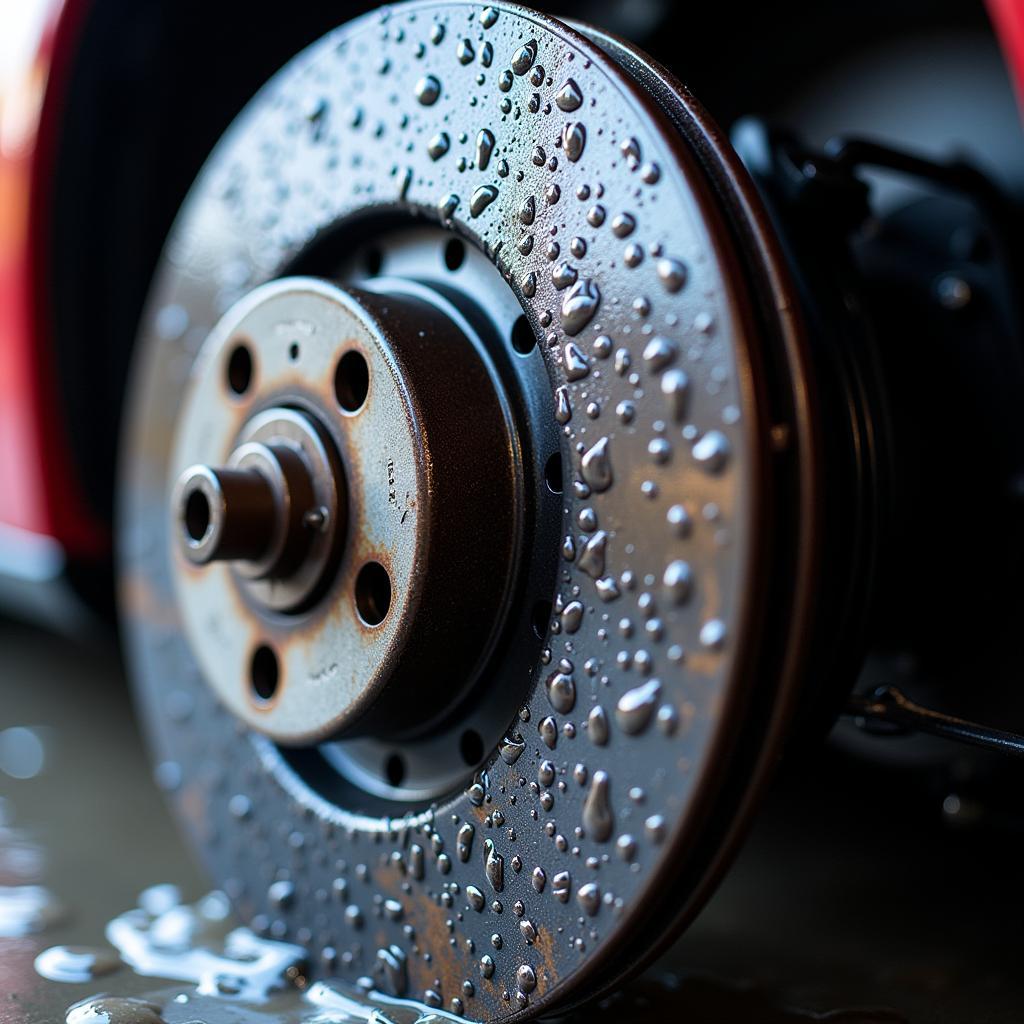Experiencing brake issues after a car wash can be alarming. This article dives deep into the reasons why you might encounter Problems With Brakes After Washing Car and provides solutions to get you back on the road safely. We’ll explore common causes, troubleshooting tips, and preventive measures to ensure your brakes remain in top condition.
 Wet brake rotor after a car wash
Wet brake rotor after a car wash
One of the most common reasons for brake problems after washing a car is water intrusion. Water can interfere with various brake components, leading to decreased braking performance or strange noises. This can manifest as a soft brake pedal, grinding sounds, or even a pulling sensation when braking. If you’ve experienced car braking problems in the past, you know how unsettling this can be. It’s crucial to address these issues promptly to ensure your safety and prevent further damage. You might be interested in reading more about general car braking problems.
Understanding the Impact of Water on Your Brakes
Water can affect your brakes in several ways. It can temporarily reduce friction between the brake pads and rotors, leading to reduced braking power. This is often experienced as a soft or spongy brake pedal feel. Water can also cause corrosion and rust on brake components over time, especially if not addressed quickly. In some cases, water can even contaminate brake fluid, affecting its hydraulic properties.
How Water Affects Brake Pads and Rotors
The most immediate effect of water on your brakes is the reduction of friction between the brake pads and rotors. Think of trying to grip a wet surface; it’s much harder than gripping a dry one. The same principle applies to your brakes. When water gets between the pads and rotors, it creates a slippery layer that reduces braking efficiency. This effect is usually temporary and resolves as the brakes dry out through normal use.
Troubleshooting Brake Problems After a Car Wash
If you notice any brake issues after washing your car, the first step is to try drying the brakes. You can do this by driving slowly and applying light pressure to the brakes repeatedly. This generates heat, which helps evaporate the water. Avoid hard braking immediately after a car wash, as this can exacerbate the issue.
What to Do if Your Brakes Feel Spongy
A spongy brake pedal is a common symptom of water in the brake system. If you experience this, try the gentle braking technique described above. If the problem persists, it’s essential to have your brakes inspected by a qualified mechanic. The issue could be more serious than just water intrusion, and it’s better to be safe than sorry. You can find valuable information on how to choose the best used car with minimal issues here: what the best use car withoit a lot of problems.
Preventing Brake Problems After Washing Your Car
Preventing brake issues is always better than dealing with them after they occur. Here are some tips to keep your brakes in optimal condition:
- Avoid direct spray on brakes: When washing your car, try to avoid spraying water directly onto the brake calipers and rotors.
- Dry your brakes after washing: After washing your car, especially if you use a high-pressure washer, take a few minutes to dry your brakes. Drive slowly and apply light pressure to the brake pedal several times to generate heat and evaporate the water.
- Regular brake inspections: Have your brakes inspected regularly by a qualified mechanic, as recommended in your car’s owner’s manual.
“Regular brake maintenance is key to preventing problems,” says automotive expert, Robert Johnson. “A little preventative care can go a long way in ensuring your safety on the road.”
Conclusion
Problems with brakes after washing car can be unsettling, but understanding the causes and solutions can help you address them effectively. By taking preventative measures and promptly addressing any issues, you can ensure your brakes remain in top condition and keep you safe on the road. If you encounter persistent brake problems, don’t hesitate to contact a qualified mechanic for assistance. You can reach us at AutoTipPro for further support at +1 (641) 206-8880 or visit our office at 500 N St Mary’s St, San Antonio, TX 78205, United States. For insights into past car sales trends, you might find this helpful: rental cars sold in summer 2018 west virginia problems.
“Don’t underestimate the importance of dry brakes,” adds Susan Miller, a seasoned mechanic. “Wet brakes can significantly compromise your stopping power, putting you and others at risk.”
FAQ (Frequently Asked Questions)
- Why do my brakes squeak after washing my car? This is usually due to water on the brake pads and rotors. It should resolve as the brakes dry.
- How long does it take for brakes to dry after washing? This can vary depending on driving conditions, but generally, they should dry within a few minutes of driving.
- Should I be concerned if my brakes still feel spongy after driving? Yes, this could indicate a more serious issue, and you should have your brakes inspected.
- Can washing my car damage my brakes? While a single car wash is unlikely to cause significant damage, repeated exposure to water can lead to corrosion over time.
- How often should I have my brakes inspected? Refer to your car’s owner’s manual for recommended inspection intervals.
- What should I do if my brakes grab after washing my car? This could be a sign of uneven brake pad wear or other issues. Have your brakes inspected by a mechanic.
- Is it safe to drive with wet brakes? Yes, but exercise caution and avoid hard braking until the brakes have dried.




Leave a Reply